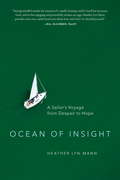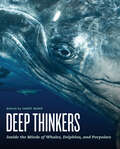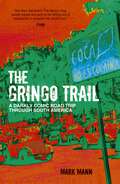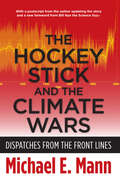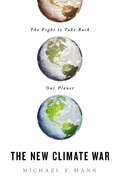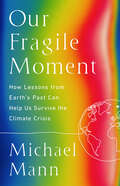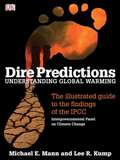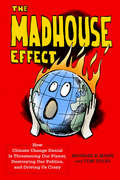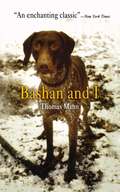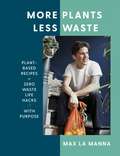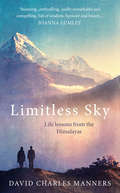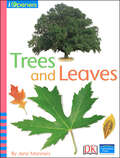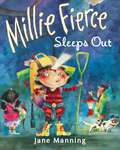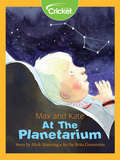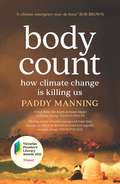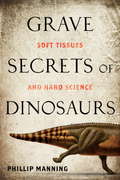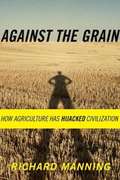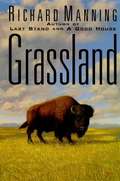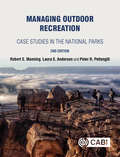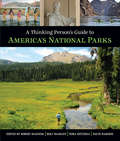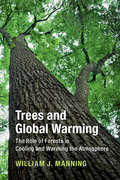- Table View
- List View
Ocean of Insight: A Sailor's Voyage from Despair to Hope
by Heather Lyn MannHeather Lyn Mann was a battle-weary environmental advocate in Madison, Wisconsin, struggling over what to do about climate change when she and her husband decided to explore the Atlantic on a small sloop. This memoir of six years living afloat is a chronological unfolding of disasters and discoveries--life-threatening storms, the boredom of isolation, societies on the brink of extinction, sinking ships, colorful Caribbean characters, near collisions, a pirate scare, and more. Throughout, the ocean becomes Mann's teacher, transforming her with uncompromising lessons on how to harmonize with natural order, the exact moments and ways to let in fearlessness, resilience, happiness, impermanence, balance, compassion, skillful action, and beginner's mind. Her suspenseful, sometimes hilarious, and always heart-warming journey of body and mind, shaped by ancient Buddhist teachings, entertains as it charts reality's depths and danger zones so arm-chair adventurers, spiritual seekers, and the climate concerned can navigate tumultuous waters and arrive together on the shore of planetary well-being.From the Trade Paperback edition.
Deep Thinkers: Inside the Minds of Whales, Dolphins, and Porpoises
by Janet MannHumans aside, dolphins, whales, and porpoises are often considered to be the smartest creatures on Earth. Science and nature buffs are drawn to stories of their use of tools, their self-recognition, their beautiful and complex songs, and their intricate societies. But how do we know what we know, and what does it mean? In Deep Thinkers, renowned cetacean biologist Janet Mann gathers a gam of the world’s leading whale and dolphin researchers—including Luke Rendell, Hal Whitehead, and many more—to illuminate these vital questions, exploring the astounding capacities of cetacean brains. Diving into our current understanding of and dynamic research on dolphin and whale cognition, communication, and culture, Deep Thinkers reveals how incredibly sophisticated these mammals are—and how much we can learn about other animal minds by studying cetacean behavior. Through a combination of fascinating text and more than 150 beautiful and informative illustrations, chapters compare the intelligence markers of cetaceans with those of birds, bats, and primates, asking how we might properly define intelligence in nonhumans. As all-encompassing and profound as the seas in which these deep cetacean cultures have evolved, Deep Thinkers is an awesome and inspiring journey into the fathoms—a reminder of what we gain through their close study, and of what we lose when the great minds of the sea disappear.
The Gringo Trail: A Darkly Comic Road Trip through South America
by Mark MannMark Mann and his girlfriend Melissa set off to explore the ancient monuments, mountains and rainforests of South America. But for their friend Mark, South America meant only one thing: drugs. Sad, funny and shocking, The Gringo Trail is a darkly comic road-trip and a revealing journey through South America’s turbulent history.
The Hockey Stick and the Climate Wars: Dispatches from the Front Lines
by Michael MannThe ongoing assault on climate science in the United States has never been more aggressive, more blatant, or more widely publicized than in the case of the Hockey Stick graph—a clear and compelling visual presentation of scientific data, put together by MichaelE. Mann and his colleagues, demonstrating that global temperatures have risen in conjunction with the increase in industrialization and the use of fossil fuels. Here was an easy-to-understand graph that, in a glance, posed a threat to major corporate energy interests and those who do their political bidding. The stakes were simply too high to ignore the Hockey Stick—and so began a relentless attack on a body of science and on the investigators whose work formed its scientific basis.The Hockey Stick achieved prominence in a 2001 UN report on climate change and quickly became a central icon in the "climate wars." The real issue has never been the graph's data but rather its implied threat to those who oppose governmental regulation and other restraints to protect the environment and planet. Mann, lead author of the original paper in which the Hockey Stick first appeared, shares the story of the science and politics behind this controversy. He reveals key figures in the oil and energy industries and the media frontgroups who do their bidding in sometimes slick, sometimes bare-knuckled ways. Mann concludes with the real story of the 2009 "Climategate" scandal, in which climate scientists' emails were hacked. This is essential reading for all who care about our planet's health and our own well-being.
The Hockey Stick and the Climate Wars
by Michael E. MannThe ongoing assault on climate science in the United States has never been more aggressive, more blatant, or more widely publicized than in the case of the Hockey Stick graph-a clear and compelling visual presentation of scientific data, put together by MichaelE. Mann and his colleagues, demonstrating that global temperatures have risen in conjunction with the increase in industrialization and the use of fossil fuels. Here was an easy-to-understand graph that, in a glance, posed a threat to major corporate energy interests and those who do their political bidding. The stakes were simply too high to ignore the Hockey Stick-and so began a relentless attack on a body of science and on the investigators whose work formed its scientific basis.The Hockey Stick achieved prominence in a 2001 UN report on climate change and quickly became a central icon in the "climate wars." The real issue has never been the graph's data but rather its implied threat to those who oppose governmental regulation and other restraints to protect the environment and planet. Mann, lead author of the original paper in which the Hockey Stick first appeared, shares the story of the science and politics behind this controversy. He reveals key figures in the oil and energy industries and the media frontgroups who do their bidding in sometimes slick, sometimes bare-knuckled ways. Mann concludes with the real story of the 2009 "Climategate" scandal, in which climate scientists' emails were hacked. This is essential reading for all who care about our planet's health andour own well-being.
The New Climate War: The Fight to Take Back Our Planet
by Michael E. MannA renowned climate scientist shows how fossil fuel companies have waged a thirty-year campaign to deflect blame and responsibility and delay action on climate change, and offers a battle plan for how we can save the planet. Recycle. Fly less. Eat less meat. These are some of the ways that we've been told can slow climate change. But the inordinate emphasis on individual behavior is the result of a marketing campaign that has succeeded in placing the responsibility for fixing climate change squarely on the shoulders of individuals.Fossil fuel companies have followed the example of other industries deflecting blame (think "guns don't kill people, people kill people") or greenwashing (think of the beverage industry's "Crying Indian" commercials of the 1970s). Meanwhile, they've blocked efforts to regulate or price carbon emissions, run PR campaigns aimed at discrediting viable alternatives, and have abdicated their responsibility in fixing the problem they've created. The result has been disastrous for our planet.In The New Climate War, Mann argues that all is not lost. He draws the battle lines between the people and the polluters-fossil fuel companies, right-wing plutocrats, and petrostates. And he outlines a plan for forcing our governments and corporations to wake up and make real change, including:a common-sense, attainable approach to carbon pricing- and a revision of the well-intentioned but flawed currently proposed version of the Green New Deal;allowing renewable energy to compete fairly against fossil fuelsdebunking the false narratives and arguments that have worked their way into the climate debate and driven a wedge between even those who support climate change solutionscombatting climate doomism and despair-mongering With immensely powerful vested interests aligned in defense of the fossil fuel status quo, the societal tipping point won't happen without the active participation of citizens everywhere aiding in the collective push forward. This book will reach, inform, and enable citizens everywhere to join this battle for our planet.
Our Fragile Moment: How Lessons from Earth's Past Can Help Us Survive the Climate Crisis
by Michael E. MannIn this sweeping work of science and history, the renowned climate scientist and author of The New Climate War shows us the conditions on Earth that allowed humans not only to exist but thrive, and how they are imperiled if we veer off course. For the vast majority of its 4.54 billion years, Earth has proven it can manage just fine without human beings. Then came the first proto-humans, who emerged just a little more than 2 million years ago—a fleeting moment in geological time. What is it that made this benevolent moment of ours possible? Ironically, it&’s the very same thing that now threatens us—climate change. The drying of the tropics during the Pleistocene period created a niche for early hominids, who could hunt prey as forests gave way to savannahs in the African tropics. The sudden cooling episode known as the &“Younger Dryas&” 13,000 years ago, which occurred just as Earth was thawing out of the last Ice Age, spurred the development of agriculture in the fertile crescent. The &“Little Ice Age&” cooling of the 16th-19th centuries led to famines and pestilence for much of Europe, yet it was a boon for the Dutch, who were able to take advantage of stronger winds to shorten their ocean voyages. The conditions that allowed humans to live on this earth are fragile, incredibly so. Climate variability has at times created new niches that humans or their ancestors could potentially exploit, and challenges that at times have spurred innovation. But there&’s a relatively narrow envelope of climate variability within which human civilization remains viable. And our survival depends on conditions remaining within that range. In this book, renowned climate scientist Michael Mann will arm readers with the knowledge necessary to appreciate the gravity of the unfolding climate crisis, while emboldening them—and others--to act before it truly does become too late.
Dire Predictions
by Michael Mann Lee R. KumpInformation on global climate change drawn from the Fourth Assessment Report of the Intergovernmental Panel on Climate Change (IPCC).
The Madhouse Effect: How Climate Change Denial Is Threatening Our Planet, Destroying Our Politics, and Driving Us Crazy
by Michael Mann Tom TolesThe award-winning climate scientist Michael E. Mann and the Pulitzer Prize–winning political cartoonist Tom Toles have been on the front lines of the fight against climate denialism for most of their careers. They have witnessed the manipulation of the media by business and political interests and the unconscionable play to partisanship on issues that affect the well-being of billions. The lessons they have learned have been invaluable, inspiring this brilliant, colorful escape hatch from the madhouse of the climate wars. The Madhouse Effect portrays the intellectual pretzels into which denialists must twist logic to explain away the clear evidence that human activity has changed Earth's climate. Toles's cartoons collapse counter-scientific strategies into their biased components, helping readers see how to best strike at these fallacies. Mann's expert skills at science communication aim to restore sanity to a debate that continues to rage against widely acknowledged scientific consensus. The synergy of these two climate science crusaders enlivens the gloom and doom of so many climate-themed books—and may even convert die-hard doubters to the side of sound science.
Desert Life
by Rachel MannA short book about life in the U.S. southwestern desert. Describes plants and animals, and people who live there. Photos are described.
Bashan and I
by Thomas Mann Herman George ScheffauerBashan and I is the moving story of Thomas Mann's relationship with his spirited German short-haired pointer. From their first encounter at a local farm, Mann reveals how he slowly grows to love this energetic, loyal, and intelligent animal. Taking daily walks in the nearby parkland, Mann begins to understand and appreciate Bashan as a living being, witnessing his native delight in chasing rabbits, deer, and squirrels along with his careful investigations of stones, fallen branches, and clumps of wet leaves. As their bond deepens, Mann is led to contemplate Bashan's inner life, and marvels at the ease with which his dog trusts him, completely putting his life into his master's hands.Over time, the two develop a deep mutual understanding, but for Mann, there is always a sense of loss at never being able to enter the private world of his dear friend, and he slowly becomes conscious of the eternal divide between mankind and the rest of nature. Nonetheless, the unique relationship quietly moves to the forefront of Mann's life, and when master and companion are briefly separated, Mann is taken aback by the depth of his loneliness without his dog. It is this deep affection for another living creature that helps the writer to reach a newfound understanding of the nature of love, in all its complexity.First published in 1916 and translated into English in 1923, Bashan and I was heralded for its simple telling of how a dog became a priceless companion, an animal who brought meaning to the author's life.
More Plants Less Waste: Plant-based Recipes + Zero Waste Life Hacks with Purpose
by Max La MannaDELICIOUS PLANT-BASED RECIPES TO WASTE LESS FOOD!Max La Manna, low waste chef and climate activist, bridges the gap between vegan food and waste-free cooking - inviting us to channel the MORE PLANTS LESS WASTE mindset and discover a stronger purpose in the kitchen and in our daily routines. --Through his viral recipe videos and work with BBC Earth and beyond, Max has inspired hundreds of thousands of people across the world to rethink their approach to food consumption and made it his mission to breathe new life into our leftovers that are typically destined for the bin. In his first cookbook he shares 80 of his tastiest, healthy recipes that are bursting with flavour, will help you save money, food and ensure you eat well - from Sumptuous Spag Bol and Vegan Shepherd's Pie to Pumpkin Pasta, Crunchy Cauliflower Curry or Leftover Veggie Nachos in a Hurry.. MORE PLANTS->LESS WASTE INCLUDES: - simple, accessible ingredients that celebrate the power of vegetables and wholefoods at their best- breakfasts, lunches, dinners, soups, stews and salads - plus sweet treats- all-natural home hacks from DIY deodorant to Citrus Bomb House Cleanser - the life tools you need to add value to what you already own and set you on the path to living more sustainably - a 21-day zero waste challenge
More Plants Less Waste: Plant-based Recipes + Zero Waste Life Hacks with Purpose
by Max La MannaMax La Manna, zero waste chef and sustainability advocate, bridges the gap between vegan food and waste-free cooking - inviting us to channel the MORE PLANTS LESS WASTE mindset and discover a stronger purpose in our daily routines. --Max has inspired thousands of people across the world to rethink their approach to consumption and made it his mission to turn the tide on plastic and breathe new energy into the leftovers that are typically destined for the bin. In his first cookbook he will share 80 of his tasty, healthy recipes that will have your taste buds watering, help you save money, food and eat well from Sumptuous Spag Bol and Crunchy Cauliflower Curry to Leftover Veggie Nachos in a Hurry.. MORE PLANTS->LESS WASTE INCLUDES: - simple, accessible ingredients that celebrate the power of plants and wholefoods at their best- all-natural home hacks from DIY deodorant to Citrus Bomb House Cleanser - the life tools you need to add value to what you already own and set you on the path to living more sustainably - a 21-day zero waste challenge--With a little more thought we can all make small changes that will have a BIG, positive impact on the health of our planet. --
Limitless Sky: Life lessons from the Himalayas
by David Charles MannersThis is the remarkable true story of a young man's initiation in the Himalayas. David Manners was trekking in Nepal when he stumbled upon the mountain home of a jhankri, or Nepalese shaman. The jhankri accepted David as his pupil, and so began the next stage of David's extraordinary journey, in which he embarked upon an adventure that was more challenging and, ultimately, life-affirming than anything he could have imagined. In Limitless Sky, David shares the wisdom and insights he learnt from those transformational days in the Himalayas. These include practical guidance on how to live a full and fearless life, how to find happiness and how to live in ways that nurture both ourselves and others. As David reveals, the life lessons he learned amongst the mountains of the Himalayas could benefit us all today.
iOpener: Trees and Leaves (iOpeners)
by Jane MannersIn Trees and Leaves, schoolchildren will learn to identify many different leaves and the trees they come from by their size, shape, and color. This 33-word book includes discussion questions and bright, clear photography to teach children all they need to know about leaves and trees.Grade: KindergartenSubject: Life ScienceGenre: Informational TextComprehension Skill/Strategy: Draw ConclusionsDiagnostic Reading Assessment (DRA/EDL): 6Guided Reading Level: DLexile Level: 6DK's iOpeners equip K-6 students with the skills and strategies they need to access and comprehend nonfiction so that they are not only learning to read but reading to learn. The combination of high-interest content and eye-popping photography of iOpeners brings science and social studies topics to life, raises student achievement in reading, and boosts standardized test scores.
Millie Fierce Sleeps Out (Millie Fierce)
by Jane ManningLittle girls can be strong and fierce and brave—and sometimes their ferocity is just the thing they need to save the day.Millie is strong. Millie is fierce. But Millie has learned to keep her fierceness in check. And since she’s been sweet all summer long, Millie gets to have a sleepout with her friends. One where she promises to be well behaved. But things don't go as Millie planned, and our fierce little heroine is not happy. Still, she tries her best to keep her fierceness inside. But when the scary dog from next door howls at the girls' tent, Millie's ferocity saves them all!A perfect addition to a bookshelf filled with Fancy Nancy, Eloise, Olivia, and Ladybug Girl.Praise for the Millie Fierce books:*"Readers already know what Millie learns: To everything there is a time and purpose, including fierceness; they will welcome this validation."--Kirkus Reviews, starred review"Millie Fierce is a delightfully naughty mix between Maurice Sendak's Where the Wild Things Are and Molly Bang's When Sophie Gets Angry."--School Library Journal"An unexpected Yeatsian lilt to Manning's writing ("Millie frizzed out her hair and made the crazy eye") lifts the text out of the ordinary; her powers of observation set it apart, too."--Publishers Weekly
Max and Kate: At the Planetarium
by Mick ManningDid you know you can explore space and visit the stars from right here on planet Earth? Follow along with Max and Kate as they visit a science museum and learn about the night sky.
Body Count: How Climate Change is Killing Us
by Paddy ManningSuddenly, when the country caught fire, people realised what the government has not: that climate change is killing us.But climate deaths didn&’t start in 2019. Medical officers have been warning of a health emergency as temperatures rise for years, and for at least a decade Australians have been dying from the plagues of climate change – from heat, flood, disease, smoke. And now, pandemic.In this detailed, considered, compassionate book, Paddy Manning paints us the big picture. He revisits some headline events which might have faded in our memory – the Brisbane Floods of 2011; Melbourne&’s thunderstorm asthma fatalities of 2016 – and brings to our attention less well-publicised killers: the soil-borne diseases that amplify after a flood; the fact that heat itself has killed more people than all other catastrophes put together. In each case, he has interviewed scientists to explore the link to climate change and asks how – indeed, whether – we can better prepare ourselves in the future.Most importantly, Manning has spoken to survivors and the families of victims, creating a monument to those we have already lost. Donna Rice and her 13-year-old son Jordan. Alison Tenner. The Buchanan family. These are stories of humans at their most vulnerable, and also often at their best. In extremis, people often act to save their loved ones above themselves. As Body Count shows, we are now all in extremis, and it is time to act.Respected journalist Paddy Manning tells these stories of tragedy and loss, heroism and resilience, in a book that is both monument and warning. &‘A climate emergency tour de force.' Dr Bob Brown 'True stories of heroism and unimaginable loss...Body Count is a brilliant exposition of why we must deal with the climate problem now.' Ross Garnaut 'Climate change kills. … Through the accounts of people who have lost so much, Paddy Manning drives home the deeply personal impact of climate change. Governments continue to ignore the impact on climate change on human health at OUR peril. The future of our planet and our future generations depends on everyone playing their part, today.' Professor Kerryn Phelps 'A stunningly powerful call to political leaders everywhere who hear the warnings of the devastating impacts of climate change on health but fail to act.' Dr Helen Haines, independent member for Indi &‘Moving stories of heroic courage and tragic loss. A pause to reflect on the lives lost and how urgently we need change.&’ David Pocock, former Wallabies captain
Grave Secrets of Dinosaurs: Soft Tissues and Hard Science
by Phil ManningMany of us have seen dinosaur bones and skeletons, maybe even dinosaur eggs, but what did those fearsome animals really look like in the flesh? Soft-tissue fossils give tantalizing clues about the appearance and physiology of the ancient animals. Bone structure is just the beginning of our knowledge today, thanks to amazing digs like these. Drawing on new breakthroughs and cutting-edge techniques of analysis, Dr. Manning takes us on a thrilling, globe-spanning tour of dinosaur mummy finds from the first such excavation in 1908 to a baby dinosaur unearthed in 1980, from a dino with a heart in South Dakota to titanosaur embryos in Argentina. And he discusses his own groundbreaking analysis of Dakota, discovered by Tyler Lyson. Using state-of-the-art technology to scan and analyse this remarkable discovery, National Geographic and Dr. Manning create an incredibly lifelike portrait of Dakota. The knowledge to be gained from this exceedingly rare find, and those that came before it, will intrigue dinosaur-loving readers of all ages.
Against the Grain: How Agriculture Has Hijacked Civilization
by Richard ManningIn this bold book, Richard Manning narrates a fascinating revisionist history of agriculture, from the domestication of plants and animals ten thousand years ago to today's corporate megafarms. Instead of a bucolic Ur-myth, Manning portrays an enterprise that was from its inception expansionist, and that did not so much accompany colonialism as drive it. Drawing on the work of anthropologists, biologists, archaeologists, and historians, as well as on his own extensive research, he traces a commodification of grain that has reached its apex in contemporary agribusiness and that has helped to build some of the most familiar -- and dysfunctional -- features of our political and economic landscape.
Grassland: The History, Biology, Politics, and Promise of the American Prairie
by Richard ManningThe author, an award-winning journalist and nature writer, looks at the grasslands of the American West and Midwest, tracing the region from pre-history to the present. He discusses attempts to control the land and efforts to restore native grasses and wild herds of buffalo, and visits Ted Turner's progressive and controversial Montana ranch. Annotation c. by Book News, Inc., Portland, Or.
Managing Outdoor Recreation: Case Studies in the National Parks
by Robert Manning Laura E Anderson Peter PettengillThis fully updated second edition presents a conceptual framework of outdoor recreation management in the form of a series of management matrices. It then illustrates this framework through new and updated case studies in the US national parks, and concludes with the principles of outdoor recreation management. Written by an author team with extensive academic and practical experience in the field of outdoor recreation, the book: - Develops and presents a matrix-based framework of strategies and practices for managing outdoor recreation in a sustainable way. - Illustrates application of best management practices through a series of case studies in diverse national parks. - Includes lecture slides and online matrices to aid the teaching of outdoor recreation management to a new generation. Managing Outdoor Recreation, 2nd Edition is an essential resource for undergraduate and graduate students of parks, outdoor recreation and related subjects, as well as a helpful tool for practitioners.
A Thinking Person's Guide to America's National Parks
by Robert Manning Rolf Diamant Nora Mitchell David HarmonThe book delves into issues affecting an array of parks: the iconic western national parks like Yellowsto≠ the urban parks such as Golden Gate National Recreation Area; historic sites including the Statue of Liberty National Monument and Gettysburg National Military Park; and cultural areas like Mesa Verde National Park that are among America's over 400 national parks. Twenty-three essays from contributing authors with deep personal and professional connections to the national parks serve as expert guides to places in the park system where: much of the nation's biological and cultural diversity is represented;ideas such as freedom, civil rights, and conservation were conceived;vast wilderness offers solitude and reflection;storied landscapes preserve a sense of place;the balance between recreation and preservation is tested;research and learning engage the next generation;the dynamics of nature are being shaped by a changing climate; and innovations in technology, sustainability, and stewardship provide a sense of purpose and hope.
Trees and Global Warming: The Role of Forests in Cooling and Warming the Atmosphere
by William J. ManningLarge-scale tree planting is advocated to provide additional atmospheric cooling and further reduce global warming. This raises a question about the present time: do trees cool or warm the atmosphere? This question does not have a simple yes or no answer. Examination of the greenhouse effect, global warming and the carbon cycle, and how trees and forests function provides the basis for understanding how forests might cool or warm the atmosphere. Results from research and models indicate that cooling or warming depends on where forests are located and the type and color of trees. Cooling generally prevails over warming, but this may change. This book will appeal to anyone interested in climate change, ecology and conservation.
